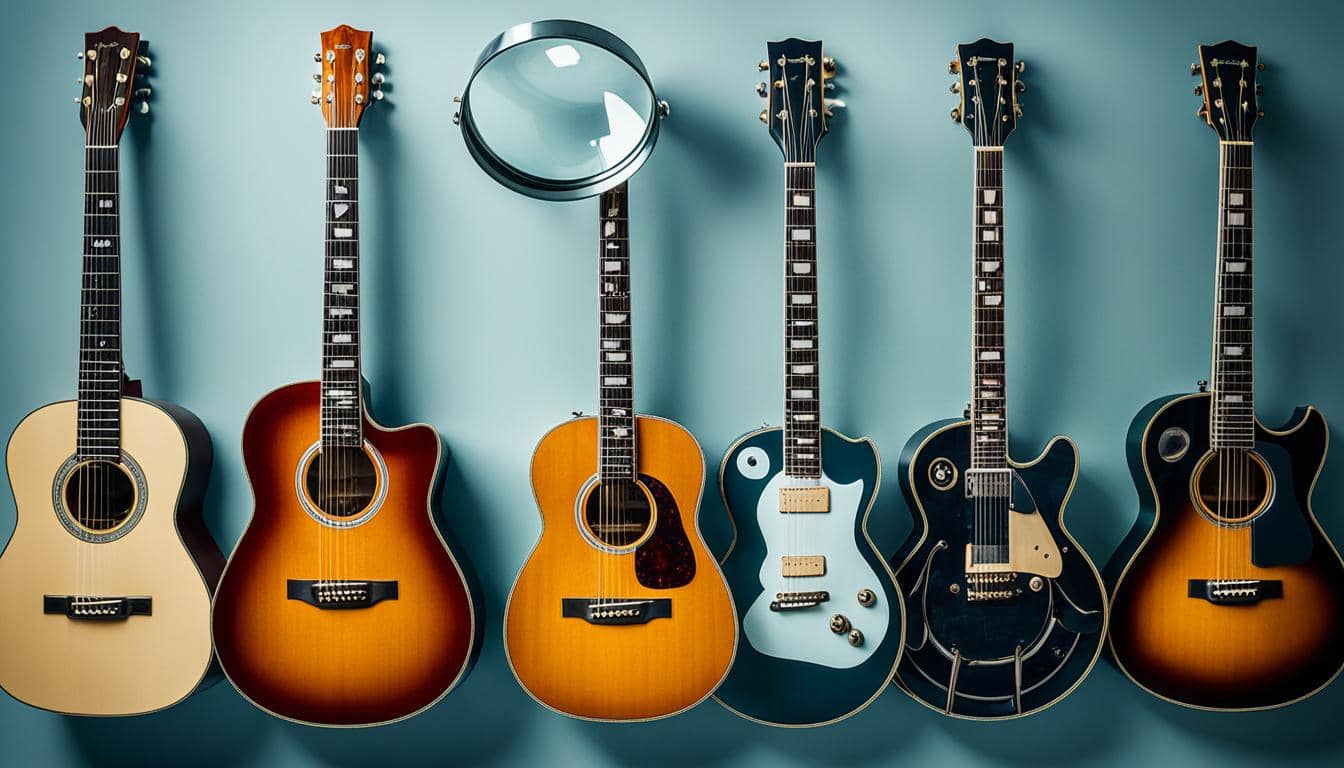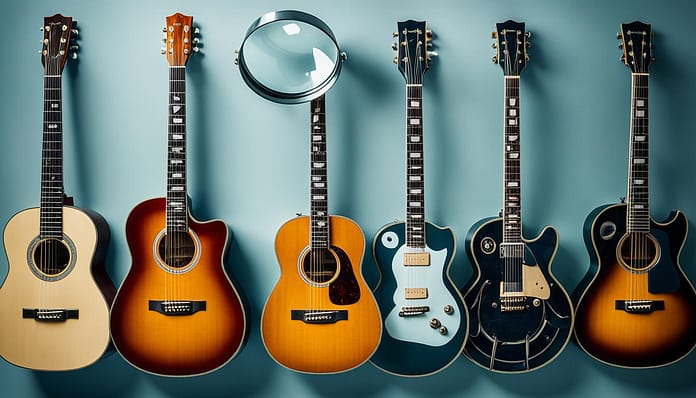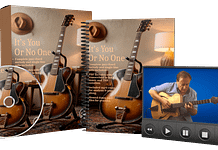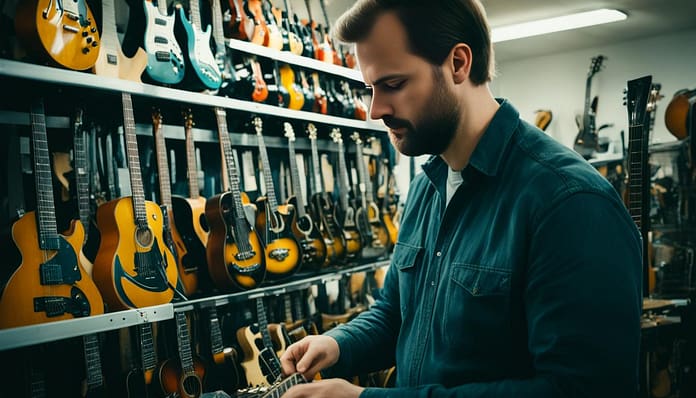This post may contain affiliate links. As an Amazon associate, Google associate as well as associate for other programs, Guitar & Music Institute may earn commissions from qualifying purchases.

Welcome to our expert guide on buying a second hand guitar! Whether you’re a seasoned guitarist or just starting out, purchasing a used guitar can be a great way to get a high-quality instrument at a more affordable price. In this article, we will provide you with valuable tips and advice to help you make a successful second hand guitar purchase.
When buying a second hand guitar, there are a few key factors to consider. First and foremost, it’s important to thoroughly inspect the guitar to ensure its overall condition. Check the neck for any signs of warping or damage, examine the bridge and tuning machines for stability, and inspect the body for any cracks or dents. Don’t forget to test the electronics, such as the EQ and pickups, to ensure they are functioning properly.
There are both pros and cons to buying a used guitar. On the positive side, you can often find unique models that are no longer in production, and the price point is usually lower compared to buying new. However, there is a risk of purchasing a guitar with hidden issues or excessive wear and tear. It’s important to weigh these factors and make an informed decision based on your own preferences and budget.
Key Takeaways:
- Thoroughly inspect the used guitar before making a purchase.
- Weigh the pros and cons of buying a used guitar.
- Research the market value of the guitar to ensure a fair price.
- Consider buying from reputable online platforms or physical stores.
- After buying, have the guitar inspected by a professional and take proper care of it.
What to Look for When Buying a Used Guitar
When buying a used guitar, it’s essential to pay attention to several important details to ensure you’re making a wise purchase. Don’t get swayed solely by the brand or model; instead, take the time to thoroughly inspect the guitar before making a decision.
If you’re considering an acoustic guitar, focus on checking the condition of the neck, bridge, tuning machines, body, and EQ. Look for any signs of damage, such as cracks or warping, and ensure that everything is properly aligned and functioning.
For electric guitars, pay close attention to the pickups, tonal knobs, hardware, tuning machines, and neck. Make sure the pickups are in good working condition and that the tonal knobs respond accurately. Check for any loose or worn-out hardware, such as screws or knobs, and ensure the tuning machines are smooth and functional. Examine the neck for any signs of damage or warping, and play every note on the guitar neck to ensure there are no dead frets or buzzing.
Remember, buying a used guitar can be a fantastic way to find a high-quality instrument at a more affordable price. By paying attention to these important details during your inspection, you’ll be able to make an informed decision and find a used guitar that suits your preferences and playing style.
Pros & Cons of Buying a Used Guitar
When it comes to buying a guitar, you have the option of purchasing either a brand new instrument or a used one. While buying a new guitar can be exciting, there are also several advantages to consider when buying a used guitar.
Firstly, one of the main benefits of buying a used guitar is cost savings. Used guitars are generally more affordable compared to their brand new counterparts. This is especially beneficial for beginners who are just starting out and may not have a large budget to invest in an expensive instrument. By opting for a used guitar, you can get a high-quality instrument at a fraction of the price.
Secondly, buying a used guitar opens up a wider range of options. You may come across models and brands that are no longer available as new instruments. This allows you to explore different styles and sounds that may suit your preferences better than what is currently available in the market. With a used guitar, you have more choices and the opportunity to find a unique instrument that resonates with your musical style.
However, it’s important to consider the potential drawbacks of buying a used guitar. One of the cons is the risk of hidden issues or wear and tear. Since used guitars have been played before, they may have minor cosmetic flaws or technical problems that need attention. It’s crucial to thoroughly inspect the guitar and inquire about its history before making a purchase. Additionally, not all sellers may be honest about the condition of the guitar, so caution is advised.
Ultimately, the decision to buy a used guitar depends on your budget, preferences, and willingness to take on any necessary repairs or maintenance. If you are looking for affordability, a wider range of options, and don’t mind a little extra care, a used guitar can be a great choice. Just be sure to do your due diligence before making a final decision. With the right research and attention to detail, a used guitar can provide you with a high-quality instrument that is full of character and ready to make beautiful music.
Where to Buy Used Electric Guitars
When it comes to purchasing a used electric guitar, you have a variety of options to choose from, both online and in physical stores. Whether you prefer the convenience of online shopping or the hands-on experience of browsing in person, there are several reliable sources where you can find the perfect used electric guitar for your musical needs.
Online Platforms
Online platforms such as eBay, Facebook Marketplace, and Reverb offer a vast selection of used electric guitars. These platforms provide access to individual sellers as well as reputable music stores that specialize in selling pre-owned instruments. Take advantage of the wide range of choices available but exercise caution by thoroughly researching sellers and carefully reading product descriptions. Remember to act responsibly and trust your instincts when making a purchase online.
Physical Stores
If you prefer a more hands-on approach and want to try out different guitars before buying, visiting a physical store is a great option. Established music stores like Guitar Center are known for their extensive selection of both new and used guitars. The advantage of buying from a physical store is that their used guitar inventory is often inspected by professionals. This ensures that you can trust the quality and condition of the instruments available for sale. Additionally, you have the opportunity to ask questions and seek guidance from knowledgeable staff members who can help you make an informed decision.
Whether you choose to explore online platforms or visit physical stores, the choice ultimately depends on your personal preferences and comfort level. Consider factors such as convenience, price range, availability, and the overall experience you are seeking. Whichever avenue you choose, take your time, do your research, and keep your musical goals in mind. By doing so, you are more likely to find a high-quality used electric guitar that brings you joy and inspires your musical journey.
Researching What a Guitar is Worth
Before buying a used guitar, it is crucial to research its value to ensure you are getting a fair price. Here are some steps you can take to determine the worth of a guitar:
1. Check the new price:
If the guitar you are interested in is still in production, check the manufacturer’s website or authorized dealers to see the current retail price. This will give you a baseline for comparison.
2. Research completed sales:
Platforms like eBay provide a valuable resource for researching completed sales of similar guitars. Look for listings that match the make, model, and condition of the guitar you are interested in. This will give you an idea of what similar guitars have sold for recently.
3. Assess current listings:
Explore online marketplaces and classified ads to see what price range the guitar is currently being listed at. Pay attention to the condition, age, and any unique features that may impact the price. This will help you gauge the market value of the guitar.
By conducting thorough research and considering factors such as the guitar’s new price, recent sales, and current listings, you can make an informed decision about the value of the guitar you are interested in. This knowledge will empower you to avoid overpaying or potentially falling for a deal that seems too good to be true.

Remember, determining the worth of a guitar is an essential step in the buying process. Take the time to research and arm yourself with knowledge to ensure you make a smart and well-informed purchase.
What to Look For When Buying a Used Guitar
When you’re in the market for a used guitar, it’s essential to consider several key factors to ensure that you make the right choice. By paying attention to these crucial details, you’ll be able to find a used guitar that meets your needs and offers a great playing experience.
First and foremost, you should carefully examine the condition of the guitar’s neck, frets, tuners, body, and hardware. Inspect for any signs of damage, such as dings, scratches, or rust, as these can affect the playability and sound quality of the instrument.
To ensure optimal playability, take the time to check for any dead or buzzing frets. Play each note on the guitar neck to ensure a smooth and even sound. This will help you determine if there are any issues with the frets or neck that may require repairs or adjustments.
Additionally, consider the type of guitar you are purchasing, whether it’s an acoustic or electric guitar, and focus on the specific features and components that are important to you. For acoustic guitars, pay attention to the tone, resonance, and overall sound quality. On the other hand, for electric guitars, take note of the pickups, tonal knobs, and other electronic components.
By evaluating these factors thoroughly, you’ll be able to make an informed decision when buying a used guitar. Remember, finding a guitar that suits your playing style, preferences, and budget is the key to enjoying your musical journey to the fullest.
How to Negotiate a Better Price on Used Guitars
Negotiating the price of a used guitar can be a smart strategy to secure a better deal. Before you start, it’s essential to research the market value of the guitar you’re interested in. This will give you a solid foundation to make an informed offer and negotiate from a position of knowledge.
Communication with the seller is key during the negotiation process. Be prepared to ask questions and express any concerns or issues you have noticed with the guitar. This shows the seller that you are a serious buyer and can give you an advantage when it comes to negotiating the price.
When engaging in negotiations, it’s important to be respectful and knowledgeable. Highlight any imperfections or necessary repairs and use them as leverage to negotiate a lower price. Additionally, you can inquire about including accessories or covering shipping costs as part of the deal.
Remember, negotiation is a two-way street. Be open to compromises and find a middle ground that works for both you and the seller. By employing these negotiation tactics, you can increase your chances of securing a better price on a used guitar and walk away with a great deal.

How to Avoid Scams and Dishonest Sellers
When buying a used guitar, it is important to be cautious and aware of potential scams and dishonest sellers. Protect yourself and your investment by following these helpful tips:
Thoroughly Research the Seller
Prior to making a purchase, take the time to research the seller. Look for any available information about their reputation and feedback from previous buyers. This will give you a sense of their trustworthiness and reliability.
Ask for Additional Photos and Information
Don’t hesitate to ask the seller for additional photos and information about the guitar. This will allow you to get a closer look at any potential flaws or damage before finalizing your purchase.
Meet in Person if Possible
Whenever possible, try to meet the seller in person to inspect the guitar before completing the transaction. This will give you the opportunity to assess the guitar’s condition firsthand and ensure its authenticity.
Use Reputable Platforms
Consider using reputable platforms, such as eBay, that offer buyer protection. These platforms have measures in place to safeguard your purchase and provide assistance in case of any issues or disputes.
Trust Your Instincts
If something seems too good to be true or the seller is reluctant to provide necessary information, trust your instincts and proceed with caution. It’s always better to be safe and find a more trustworthy option.
By following these tips, you can avoid scams and dishonest sellers when buying a used guitar. Remember to prioritize your safety and conduct thorough research to make a confident and informed purchase.
What to Do After Buying a Used Guitar
After purchasing a used guitar, there are several steps you should take to ensure its longevity and optimal performance. Following these recommendations will help you maximize your enjoyment and make the most of your used guitar.
1. Have the Guitar Inspected by a Professional Luthier: It is highly recommended to have your newly acquired used guitar inspected by a professional luthier. They can identify any potential issues or necessary repairs that may need to be addressed. This will ensure that your guitar is in the best possible condition, allowing you to play it with confidence.
2. Clean and Maintain Regularly: To keep your used guitar in top shape, it’s essential to clean and maintain it regularly. Use a soft cloth to wipe down the body, neck, and strings after each use to remove any dirt or sweat. Additionally, consider using appropriate guitar cleaning products to keep the instrument looking and sounding its best.
3. Proper Storage: Storing your used guitar properly is crucial to protect it from damage. Invest in a sturdy case or gig bag to provide a safe environment when the guitar is not in use. Keep it away from extreme temperatures, humidity, and direct sunlight, as these conditions can adversely affect the instrument’s integrity and playability.
4. Explore Guitar Tutorials and Apps: To enhance your playing experience and continue developing your skills, take advantage of the wealth of guitar tutorials and apps available online. These resources offer lessons, chord charts, and practice exercises that can help you unlock new techniques and expand your musical repertoire.
Recommended Actions After Buying a Used Guitar:
- Have the guitar inspected by a professional luthier.
- Clean and maintain the guitar regularly.
- Store the guitar in a proper case or gig bag.
- Explore guitar tutorials and apps for continued learning.
By following these steps, you’ll ensure that your used guitar remains in excellent condition, providing you with many hours of enjoyment and inspiration. Start playing your newly acquired instrument with confidence and make beautiful music!
Conclusion
Buying a second hand guitar can be an enjoyable and cost-effective way to add a new instrument to your collection. However, it’s crucial to approach the process with caution and careful consideration. By following the tips provided in this article, you can make informed decisions and increase your chances of finding a high-quality used guitar that suits your needs.
Thoroughly inspecting the guitar before purchasing is essential. Pay close attention to the condition of the neck, bridge, tuning machines, body, and other important components. Researching the value of the guitar will help you determine a fair price and avoid overpaying. Additionally, negotiating the price with the seller can sometimes lead to a better deal.
It’s also important to be aware of potential scams and dishonest sellers. Do your due diligence by researching the seller, checking their reputation and feedback, and asking for additional information or photos of the guitar. Trust your instincts and walk away from any suspicious listings or sellers who refuse to provide necessary information.
Once you’ve successfully purchased a used guitar, remember to take good care of it. Regular cleaning and maintenance, proper storage, and occasional professional inspection can help ensure the longevity and performance of your instrument. By following these tips, you can embark on a rewarding musical journey with your new second hand guitar.
FAQ
What should I look for when buying a used guitar?
When buying a used guitar, it is important to thoroughly inspect the condition of the neck, bridge, tuning machines, body, EQ, pickups, tonal knobs, hardware, and frets. Play every note on the guitar neck to check for dead frets or buzzing strings.
What are the pros and cons of buying a used guitar?
The pros of buying a used guitar include affordability and a wider range of options. You can find models that may no longer be available new. However, there is a risk of hidden issues or wear and tear, and not all sellers may be honest about the guitar’s condition.
Where can I buy used electric guitars?
You can buy used electric guitars from online platforms like eBay, Facebook Marketplace, and Reverb. Physical stores like Guitar Center also offer a selection of used guitars that have been inspected by professionals.
How can I determine the value of a used guitar?
To determine the value of a used guitar, research its new price (if still in production), check completed sales on platforms like eBay, and assess current listings to understand the price range for the model. Thorough research helps avoid overpaying or getting a deal that seems too good to be true.
How can I negotiate a better price on a used guitar?
Research the market value of the guitar, communicate with the seller, ask questions, and express any concerns. By being respectful and knowledgeable, you may be able to negotiate a lower price or additional benefits.
How can I avoid scams and dishonest sellers when buying a used guitar?
To avoid scams, thoroughly research the seller, check their reputation and feedback, ask for additional photos or information, and consider meeting in person or using reputable platforms that offer buyer protection.
What should I do after buying a used guitar?
After purchasing a used guitar, have it inspected by a luthier, clean and maintain it regularly, store it properly, and consider investing in a case or gig bag for protection. Take advantage of resources like tutorials or apps to enhance your playing experience.
This post may contain affiliate links. As an Amazon associate, Google associate as well as associate for other programs, Guitar & Music Institute may earn commissions from qualifying purchases.



















